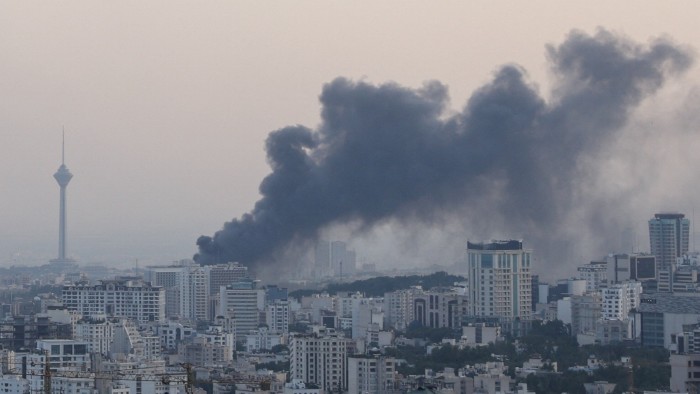Unlock the White House Watch newsletter for free
Your guide to what Trump’s second term means for Washington, business and the world
The writer is director of Chatham House’s Middle East and north Africa Programme
Three men — Iran’s supreme leader Ayatollah Ali Khamenei, US President Donald Trump and Israeli Prime Minister Benjamin Netanyahu — stand at the centre of the unfolding war between Israel and Iran. Each has wielded ideological conviction, personal style and strategic instinct to shape their leadership trajectories. Now, their egos and world views are colliding, with consequences for the wider Middle East. In war, it’s not just policies that matter — personalities do too. Indeed, the ambitions of leaders often steer history more than armies or institutions.
Khamenei, now 86, has spent more than three decades at the helm of the Islamic republic. While often cast as a cautious cleric who rose by default after Ayatollah Ruhollah Khomeini’s death in 1989, he has demonstrated shrewd adaptability and a consistent strategic vision. His leadership is marked by deep suspicion of the west and an unwavering belief in the Islamic republic’s mission as the vanguard of resistance against western imperialism and Israeli aggression at the expense of the Iranian people.
Under Khamenei, the Islamic republic has transformed from an inward-looking theocracy to an ambitious actor that has projected regional power through its destabilising network of militias in Iraq and Syria and proxy networks in Lebanon and Yemen.
Khamenei’s personality — calculating and ideologically rigid — has been both an asset and liability. It allowed the regime to endure threats on Iran’s borders during the 2001 and 2003 US invasion of Afghanistan and Iraq. His instinct, honed by years of survival in a volatile region, has been to avoid full-scale escalation and play for time. While he did support negotiations prior to the 2015 nuclear deal, he remained perpetually suspicious of US intentions — always fearing Washington’s broader goal was regime change.
This distrust sabotaged Iran’s small window of opportunity after the 2015 nuclear deal. Rather than empower moderates such as then president Hassan Rouhani, Khamenei maintained a hostile posture. This included ramping up nuclear enrichment, backing strikes against Saudi oil facilities and bolstering allied militias like Hamas, Hizbollah and the Houthis, all while increasing rounds of brutal repression at home.
In recent months, Khamenei has supported negotiations with the Trump administration in the hope of rescuing Iran’s economy from international sanctions, corruption and mismanagement. He was hoping to rehabilitate his flailing legitimacy by planning for succession. But Israel’s strikes mark a rupture.
Now, he faces the greatest challenge of his tenure: a war that threatens his regime’s carefully fortified foundations. If this further destabilises the regime or if Khamenei is seen as capitulating, it could mark the end of Iran’s theocratic model.
Meanwhile Netanyahu, the most polarising figure in Israeli politics, has made it clear that such regime capitulation, if not regime change, is a key objective. He has built his career on charisma, polarising rhetoric, an uncanny ability to outmanoeuvre rivals and a reading of history that depicts Jews as perpetually under siege. This worldview defines his response to both diplomacy and war. His opposition to the Iran nuclear deal in 2015, stance on Iran’s broader threat to Israel’s security and eventual support for the Abraham Accords are driven more by personal conviction than Israeli popular opinion.
In the wake of Hamas’s brutal October 7 attacks and the devastating war in Gaza, Netanyahu has been accused of allowing domestic divisions to distract from security threats and has faced international isolation. But his instinct remained to project strength, avoid compromise and outlast his enemies. Now he is widely seen as the man who took the fight directly to Tehran.
Finally, there is Trump, whose presence looms large over this crisis. Impulsive and transactional, it was his 2018 decision to unilaterally withdraw from the Iran nuclear deal — after direct lobbying from Israel and Gulf leaders — and begin a maximum pressure campaign that forced Tehran into a corner.
Trump’s foreign policy has lacked consistency but not impact. His rapport with Netanyahu helped catalyse the 2020 Abraham Accords, a vision for Israel’s integration into a new Middle East. Yet his approach also hollowed out US credibility, leaving allies worried about America’s reliability and rivals like Khamenei unable to navigate his unpredictability. Rather than showing consistent leadership, Trump has left the world guessing about US military action in Iran. “I may do it. I may not do it,” he said, promising a decision in the next two weeks, further perpetuating anxiety.
This conflict is more than a military confrontation; it is a clash of ageing leaders now keen to secure their legacies. Khamenei, Netanyahu and Trump have paved the road to war with decades of miscalculation and brinkmanship. Much will now hinge on whether Netanyahu believes his legacy requires total victory, whether Khamenei concludes that survival demands escalation or compromise, and whether Trump accelerates a regional reckoning.
Their instincts over the coming days will not only determine the outcome of this war, but potentially the future of the Islamic republic, the credibility of US power and the stability of an already fractured Middle East.
The Israel-Iran war: how far will it go? Join an FT subscriber webinar with Sanam Vakil and FT experts on Wednesday June 25 at 1300-1400 BST (1200-1300 GMT) and put your questions to our panel






